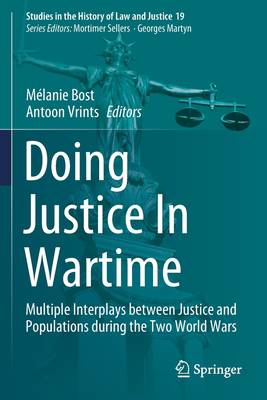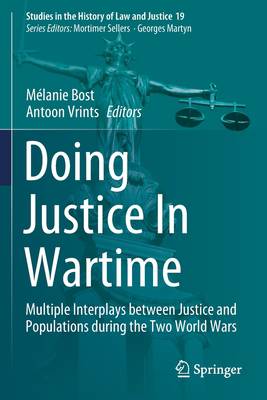
- Afhalen na 1 uur in een winkel met voorraad
- Gratis thuislevering in België vanaf € 30
- Ruim aanbod met 7 miljoen producten
- Afhalen na 1 uur in een winkel met voorraad
- Gratis thuislevering in België vanaf € 30
- Ruim aanbod met 7 miljoen producten
Zoeken
Doing Justice in Wartime
Multiple Interplays Between Justice and Populations During the Two World Wars
€ 171,45
+ 342 punten
Omschrijving
This book discusses the impact of war on the complex interactions between various actors involved in justice: individuals and social groups on the one hand and 'the justice system' (police, judiciary and professionals working in the prison service) on the other. It also highlights the emergence of new expectations of justice among these actors as a result of war. Furthermore, the book addresses justice practices, strategies for coping with the changing circumstances, new forms of negotiation, interactions, relationships between populations and the formal justice system in this specific context, and the long-term effects of this renegotiation.
Ten out of the eleven chapters focus on Belgian issues, covering the two world wars in equal measure. Belgium's diverse war experiences in the twentieth century mean that a study of the country provides fascinating insights into the impact of war on the dynamics of 'doing justice'. The Belgian army fought in both world wars, and the vast majority of the population experienced military occupation. The latter led to various forms of collaboration with the enemy, which required the newly reinstalled Belgian government to implement large-scale judicial processes to repress these 'antipatriotic' behaviours, in order to restore both its authority and legitimacy and to re-establish social peace.
Ten out of the eleven chapters focus on Belgian issues, covering the two world wars in equal measure. Belgium's diverse war experiences in the twentieth century mean that a study of the country provides fascinating insights into the impact of war on the dynamics of 'doing justice'. The Belgian army fought in both world wars, and the vast majority of the population experienced military occupation. The latter led to various forms of collaboration with the enemy, which required the newly reinstalled Belgian government to implement large-scale judicial processes to repress these 'antipatriotic' behaviours, in order to restore both its authority and legitimacy and to re-establish social peace.
Specificaties
Betrokkenen
- Uitgeverij:
Inhoud
- Aantal bladzijden:
- 186
- Taal:
- Engels
- Reeks:
- Reeksnummer:
- nr. 19
Eigenschappen
- Productcode (EAN):
- 9783030720520
- Verschijningsdatum:
- 9/06/2022
- Uitvoering:
- Paperback
- Formaat:
- Trade paperback (VS)
- Afmetingen:
- 156 mm x 234 mm
- Gewicht:
- 294 g

Alleen bij Standaard Boekhandel
+ 342 punten op je klantenkaart van Standaard Boekhandel
Beoordelingen
We publiceren alleen reviews die voldoen aan de voorwaarden voor reviews. Bekijk onze voorwaarden voor reviews.







